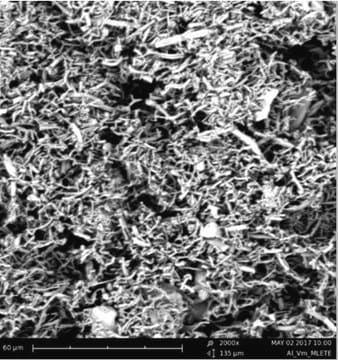551643
Aluminum oxide
nanowires, diam. × L 2-6 nm × 200-400 nm
Synonym(s):
Alumina
About This Item
Recommended Products
form
nanowires
diam. × L
2-6 nm × 200-400 nm
mp
2040 °C (lit.)
SMILES string
O=[Al]O[Al]=O
InChI
1S/2Al.3O
InChI key
TWNQGVIAIRXVLR-UHFFFAOYSA-N
Looking for similar products? Visit Product Comparison Guide
General description
Application
- Self-Assembly of Ionic Superdiscs in Nanopores.: This research explores the self-assembly of ionic superdiscs in nanopores enhanced by aluminum oxide, offering a new avenue for creating highly ordered nanostructures useful in energy storage and conversion technologies (Li et al., 2024).
- Improved Fog Collection on a Hybrid Surface with Acylated Cellulose Coating.: Demonstrates the application of aluminum oxide in developing hybrid surfaces for enhanced fog collection, a technique that could be adapted for moisture management in battery and energy systems to improve operational stability and efficiency (Zhan et al., 2024).
- Alumina - Stabilized SEI and CEI in Potassium Metal Batteries.: Research highlights the role of aluminum oxide in stabilizing solid electrolyte interphase (SEI) and cathode-electrolyte interface (CEI) layers in potassium metal batteries, crucial for enhancing the longevity and performance of next-generation batteries (Liu et al., 2024).
- 3D-Printed Carbon Nanoneedle Electrodes for Dopamine Detection in Drosophila.: Utilizes aluminum oxide in 3D-printed carbon nanoneedle electrodes, offering significant improvements in the sensitivity and specificity of neurochemical detection, applicable in battery technology for biosensors and medical devices (Shao et al., 2024).
Storage Class Code
13 - Non Combustible Solids
WGK
nwg
Flash Point(F)
Not applicable
Flash Point(C)
Not applicable
Personal Protective Equipment
Certificates of Analysis (COA)
Search for Certificates of Analysis (COA) by entering the products Lot/Batch Number. Lot and Batch Numbers can be found on a product’s label following the words ‘Lot’ or ‘Batch’.
Already Own This Product?
Find documentation for the products that you have recently purchased in the Document Library.
Customers Also Viewed
Articles
Hydrogen is one of the most important resources in providing food, fuel, and chemical products for our everyday life. Sustainable catalytic hydrogen production from bioethanol has gained significant attention in recent years due to globally diminishing fossil fuel supplies, which have necessitated the search for new chemical feedstocks.
Among various ceramics, one-dimensional (1-D) piezoelectric ceramics have attracted significant scientific attention for use in energy harvesting.
TiO2 exhibits wide band gap semiconductor and memristor properties electronically, with high opacity and UV absorbance optically.
TiO2 exhibits wide band gap semiconductor and memristor properties electronically, with high opacity and UV absorbance optically.
Our team of scientists has experience in all areas of research including Life Science, Material Science, Chemical Synthesis, Chromatography, Analytical and many others.
Contact Technical Service


